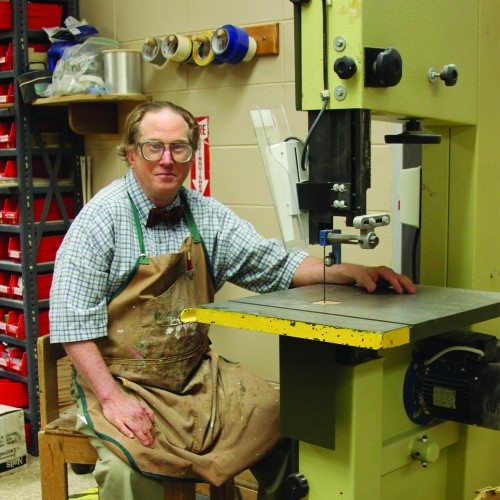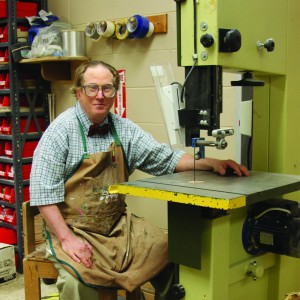Woods Man
Each wooden creation made by alumnus Jeff Bishop’s students is assembled from scratch, but still more impressive, it’s constructed by a student who has significant physical, developmental or emotional difficulties.


If Jeff Bishop’s signature wooden bowtie doesn’t make it clear enough, then the parade of handmade chairs and dressers and toys emerging from his industrial-arts classroom each day certainly does: Bishop is a guy who likes making things — and who likes to help other people make things, too.
He’s spent the last 28 years showing students at Regional Day School in Jackson, N.J., how to build anything they can dream up, from grandfather clocks to rocking chairs to guitar stands. Each wooden creation is assembled from scratch, but still more impressive, it’s constructed by a student who has significant physical, developmental or emotional difficulties.
The projects give Bishop’s students, who range in age from 5 to 21, “feelings of self-pride,” he says. “These youngsters can say, ‘Even though I’m disabled, I can still make a canoe. I can still make a chest of drawers.’ They feel their sense of worth.”
He’s engineered all sorts of special modifications using fixtures and jigs to ensure that all 110 students in Regional Day School can participate, and he assigns tasks based on each student’s abilities, often using an assembly-line setup for the physically disabled students. A blind student was recently charged with running a drill press and sanding down sharp edges. An autistic student who does not speak drilled 2,000 holes for a set of math games. A student with emotional challenges built a full-size, Mission-style grandfather clock.
Bishop understands the difficulties his students face each day because he once struggled with physical challenges of his own. He was born with a congenital heart defect — known then as a “blue baby” — and had one of the first open-heart surgeries in Philadelphia in 1957. For years, his classmates ran laps around the baseball field or played kickball in the street while Bishop sat on the sidelines. “I got to be very good at making things with my hands,” he says, learning from his father first, then taking woodshop, metal-working and drafting courses in school.
By age 14, “I needed another [heart] operation to live,” Bishop says, “and that second surgery corrected everything. I had a new lease on life, and I could do anything I wanted to.”
He joined his high school’s swim team and became an active athlete, but he also never forgot what it had been like to be labeled as “different” for those first 14 years. He began teaching swimming to children with physical disabilities and, by the time he arrived at TCNJ in 1971, he knew what he wanted to study.
“I went in and said, ‘I would like to study industrial arts and take it to the special-needs youngsters,’” Bishop recalls. “This was before the Education for All Handicapped Children Act in 1975. Special-needs youngsters were closeted back then. They were not talked about; they were not shown.”
“When I was in [grade]school, I saw that the special-needs youngsters were stuck in a self-contained classroom all day doing absolutely nothing,” he adds. “Here I was, a special-needs youngster myself, and I said, ‘I’m just as good as they are and they’re just as good as I am. Why aren’t they coming down for industrial-arts classes, too?’”
In Bishop’s senior year at TCNJ, the College approved a certification program for industrial arts in special education and he became the first of its graduates. He is a strong supporter of his alma mater, and very generously supports scholarships that directly benefit students studying technological studies at TCNJ, the school’s Dean of Engineering, Steven Schreiner, said.
Bishop went to work at Regional Day School in 1984 and has been there ever since, overseeing student projects and spearheading all sorts of traditions, including an annual canoe-building project and picnic based around STEM education requirements.
During the holiday season, Bishop’s classroom transforms into an East-Coast North Pole. If his students are the elves in Santa’s Workshop, then Bishop is the guy in the red suit, offering a warm smile and words of encouragement to each of his “workers.” It’s become an annual tradition that the students build 2,000 wooden games and toys, which are sent off to local elementary schools during the holiday season.
Bishop still finds time to construct his own wooden works, too. When the Manchester school district instituted a teacher dress code back in 1999, he knew the required necktie would be dangerous around all those machines in his classroom. Instead of heading to the mall, he built himself a wooden bowtie.
“The kids just loved it,” he says. Soon he was making bowties from poplar, cherry, sycamore, plum and ball woods. He has about 50 now. “I make it a learning experience,” he adds. “When they come in every day, the kids say, ‘What kind of wood is that in your tie?’”
His ties have made their way to hundreds of people throughout the tri-state area, including the Philadelphia Orchestra’s string section. “They were doing a photo shoot and someone noticed that the bowties kept wrinkling up,” Bishop says. “I made 12 wooden bowties from black ebony wood and I even sent one along to [former conductor] Eugene Ormandy.”
“Actually, I send them all around,” he adds, “and it’s really neat to see how they always make people smile.”
Posted on September 11, 2013

